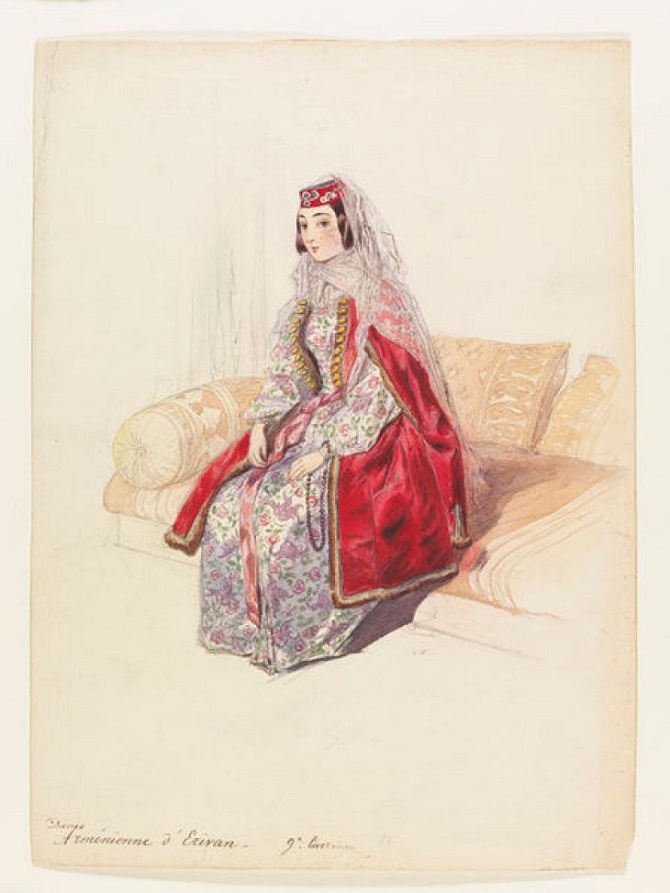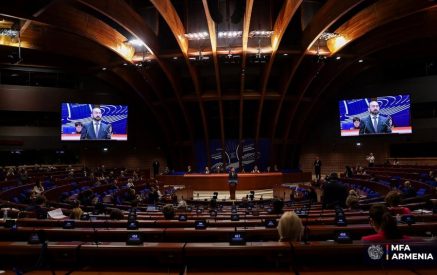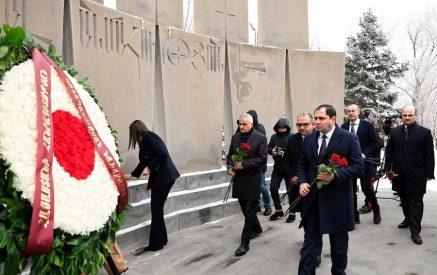The Armenian Weekly. Armenians are a proud but at times myopic people. We love to focus on the foundations of our culture, our faith, our food, our resiliency, our values, but we have trouble with our problems. The issue is not that we have challenges. Everyone on this earth is confronted with strengths and weaknesses. The question is whether we choose to manage our shortcomings or let them manage us. We still have the “elephant in the room,” the division in our church after 87 years. Yes, we have made progress, but holding joint genocide commemorations and showing some respect for each other is a long way from erasing the sin of division. This is a disgrace that has almost become “the new normal” for succeeding generations because we have institutionalized the schism. Once we offer our obligatory “isn’t the split absurd,” we fall back into our comfort zone of ambivalence.
What does that tell you about our ability to go beyond shallow change? We worry about our churches’ finances, yet we tolerate wasteful spending in duplication. We are stressed over the future of our children, yet we allow the weakening of our most important diasporan institution. We speak of being the first Christian state, yet we forget the most important lesson of forgiveness. Confronting our challenges in the diaspora must be viewed as part of the solution of sustainability.
In Armenia, behind the economic gains and nation building (which we should all be proud of) lies the stain of domestic violence and inequality against the women of our nation. It has been estimated that up to 30-percent of women in Armenia experience some form of abuse. It is a shadowy, horrible, almost invisible shame. Walk the streets of Armenia, and you will hardly see evidence of this embarrassment. It is rare to see acts of violence against women publicly. It almost seems invisible, but it isn’t. These human rights violations are committed mostly in homes, where many women are trapped in a patriarchal dictatorship. They fear for their children and have little in terms of financial options, a duplicitous behavior for a culture that reveres our mothers and grandmothers, yet tolerates their victimization.
Times are slowly changing however. It’s been a few years since Armenia passed its first domestic violence law. Granted it needs further enforcement, and enforcement requires victims to feel secure in coming forward. That, of course, gets to the root of the problem. Women in Armenia need to feel the confidence and systemic support that victims require. A primary enabler would be a parallel process of improving the participation and influence of women in society and also tearing down the walls of patriarchal discrimination. Fortunately progress has been made, particularly on the former, and will continue. In December, two important meetings took place that represent change. The Domestic Violence Council headed by Deputy Minister Zhanna Andreasyan and the Women’s Affairs Council headed by Deputy Prime Minister Tigran Avinian sponsored these representative forums.
Read also
Why is this progress? Women’s issues have historically been ignored in Armenia. These particular efforts are mandated by law and actively supported by the government. They are discussing and taking action in a realistic manner. Women’s issues are now becoming more “mainstream.” There are a number of catalysts for this progress, including the diaspora, tourism and western governments such as the European Union. But the most important has been the improved empowerment and emergence of more Armenian women in government taking on positions of influence and leading NGOs. While thankfully there are incredible young women (and men) emerging, we should never forget the women who toiled for years with no government support to bring these issues forward. Maro Matossian, for example, heads the Women’s Support Center that gives women who are victims of domestic violence and their children a real option to build a new life. Maro has devoted a majority of her adult life to advocating for women’s issues in Armenia. Her work has literally saved lives. Change in Armenia is inevitable. It is merely a question of how quickly things will improve. When considering the issue of women’s equality and ending domestic violence, one should ask, what is the purpose of a sovereign nation if all citizens do not feel free?
How can a Christian institution stay on the sidelines?
While progress is continuing, there is some sadness and frustration to address. Our church, led by His Holiness Karekin II, remains silent on this issue. Women and children, a significant majority of the faithful, are suffering and yet the church says little, if anything. It is not acceptable to say that the church supports orphanages and soup kitchens and therefore supports women. We are talking about a specific stain on our society, the mental and physical assault of women. How can a Christian institution stay on the sidelines? They should be leading on this as a human rights crisis. It deeply saddens me as a believer in our church that our beloved institution is not on the front lines leading this long overdue change. Is this the church we were raised to love that ignores such matters?
Earlier, I mentioned two aspects to this problem—the empowerment of women and the walls of patriarchal discrimination. The church is the most prominent patriarchal institution in our society. Is that an opportunity or an obstacle? Can an institution run by men use their makeup to impact the imbalance in our society by addressing the behavior of males and their upbringing? Can not the church lead the way in teaching men (and boys) that true Christian love and inequality are not compatible? What more powerful way to change society than by having role model men teaching other males that love and respect towards women (and all people) are powerful? Isn’t that what the church teaches us: to love and respect?
It’s a sound argument, but not in today’s church reality. Perhaps the silence is due to the fact that they are comfortable in their position and do not see the problem. I do not support, but I could understand their thinking in the past. Being a very political institution, they may have felt they had nothing to gain, particularly with their relationship with the previous government. Again, this might be their logic. But today with women’s issues gaining visibility, it is bizarre that they do not “get on the bandwagon.” It shows how deeply rooted the patriarchal mentality is in our church. It neutralizes action that may not be morally motivated, but politically advantageous.
Diversity of thought brings better solutions. The Armenian government is more effective with capable women and men. The church has no diversity. There are no women to bring new perspectives, and today’s leadership does not encourage diversity among the men. The result is a sad “swing and a miss” for our church. I want our church to be loved, respected and impactful in Armenian society. While important change is going on in Armenia, the church is on the sidelines on many areas of concern. This is most unfortunate and will only serve to weaken the church further. When the day comes when further equality in society is a reality, who will remember the church as one of the change agents? Our church has accepted its role as more than a spiritual home. It has been a traditional anchor of education and humanitarian needs in our nation. Today, however, the world is dealing with complex social issues that the church must address if it desires relevance. The most prominent and pressing of these concerns is the empowerment, equality and human dignity of women. It is a challenge whose time has finally arrived. Ignoring it or issuing rhetorical statements will not enable change or earn respect. Perhaps this is the most telling lesson for the church to learn. Inherited respect is on the decline as the emerging generation has new expectations.
I often wonder about the thinking of the church that supports silence. Surely, there are leaders in our church who see this problem…and this opportunity. Is their reluctance caused by a hopeless feeling that they cannot change anything, or are they fearful of their personal positions? I don’t know how people whose ministries are based on love and peace can remain silent. I have been told by many of you that there is an arrogance in the church caused by its centuries of leadership in the absence of a sovereign nation, that the church will pursue action only when it is in its interests or when it is “motivated.” I understand this mentality, but such self serving has no place in an institution based on love. I still believe there are many good servants in the church; they simply are not policymakers. Rather than ignoring the institution’s behavior, I would prefer to encourage change to prevent its self-destruction. While the church pursues its policy of silence, the diasporan church can do more. We are part of a more visible democratic structure in the church and should be sending a clear message to Holy Etchmiadzin: that the church must be vocal in opposing the physical assault and discrimination of women. The church already has quite a battle on its hands with the increasing secular ways of the world. Self-inflicted damage by the Holy See must be prevented. We should take no joy in these struggles. These issues are too important. Opportunities abound. Our church can ill afford further losses in credibility. Potential victims and those in recovery are waiting.























































